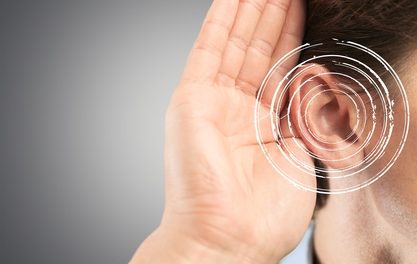Hearing Loss Causes of Deafness in One or Both Ears
Hearing loss may be partial or complete (deafness). Conditions affecting the outer ear and middle ear may affect the conduction of sound and is therefore known as conductive hearing loss. Another type of impairment is sensorineural hearing loss, which affects the conversion of mechanical sounds waves into electrical impulses which is then transmitted to the brain. This occurs in the inner ear.
In people of all ages, noise-induced hearing loss and earwax are the main causes of hearing loss, which is usually partial. In the elderly, age results in degenerative changes that may lead to hearing loss which is known as presbycusis (or presbyacusis).

Causes of Hearing Loss
The causes of hearing loss can be divided according to the affected component of auditory perception. As mentioned above, it may be either conductive or sensorineural. If both are involved, then it is referred to as mixed hearing loss.
Conductive Hearing Loss
- Wax buildup is the most common cause. Constant interference may cause impacted wax that forms a plug in the ear canal. Read more on earwax blockage.
- Foreign bodies in the ear is more commonly seen in children and may cause sudden, unilateral hearing loss. Swelling of the ear canal firmly grasps the foreign body thereby making it difficult to remove and further occluding the canal.
- Trauma to the ear drum (perforation) and sometimes extending to the ossicles may arise from injuries like an ear slap or sharp objects inserted down the ear canal, or changes in pressure (barotrauma) due to diving or flying.
- Otitis externa and otitis media may result in partial, usually temporary, impairment of the sense of hearing. Most cases are acute. Otitis externa affects the ear canal and may be due to constant irritation with water, dust, dirt and foreign objects, followed by an infection. Otitis media is a middle ear infection resulting in an fluid accumulation (effusion) within the middle ear cavity.
- Fluid accumulation in the middle ear (effusion) is a feature of otitis media, especially chronic cases. These chronic infections can severely impair hearing – either resulting in loss of hearing or muffled sounds. Chronic untreated infections can result in damage to the eardrum and ossicles. A blocked eustachian tube is usually present.
- Blocked eustachian tube is often a result of an upper respiratory tract infection or middle ear infection. Mucus in the tube or swelling of the walls causes an occlusion. This allows for fluid accumulation in the middle ear or affects the equilibrium of air pressure on either side of the eardrum.
- Other less common causes include :
- Otosclerosis
- Tumors in the middle ear
Sensorineural Hearing Loss
- Noise-induced hearing loss (acoustic trauma) is a result of loud noises. This may be linked to prolonged exposure to moderate or loud noises within the work environment and is referred to as occupation-induced hearing loss. Both high volume and prolonged exposure to sound may result in acoustic trauma. Sudden, short bursts of sound higher than 120 dB (decibels) or prolonged exposure to sounds higher than 85dB may result in noise-induced hearing loss.
- Trauma including injury during childbirth, especially to the temporal bone of the skull.
- Prenatal infections like German measles (rubella) or herpes is known to cause hearing loss. This may remain unnoticed until after 3 to 6 months of age.
- Infections such as measles, meningitis, mumps and scarlet fever.
- Presbycusis (age-related hearing loss)
- Genetic disorders
- Other less common causes include :
- Acoustic neuroma
- Ménière’s disease
- Unknown causes (idiopathic)
Hearing Loss in One Ear
Sudden sensorineural hearing loss may vary from mild to severe (deafness) and usually affects only one side (unilateral). This type of hearing loss occurs over a short period, within a few hours or sometimes almost instantaneously. In most cases of sudden loss of hearing, the condition may spontaneously resolve with a partial or complete return of the hearing. In cases where the hearing loss resolves, it usually occurs within 10 to 14 days.

Causes of Unilateral Hearing Loss
Causes of sudden hearing loss (SHL) are similar to the causes of tinnitus and should be investigated thoroughly. SHL can affect both adults and children.
Sudden hearing loss (SHL) is suspected to be caused by severe trauma to the ear, head or a cardiovascular accident (CVA or stroke) due to the rapid onset and one sided nature of the loss. However, most cases of sudden hearing loss occurs as a result of infections, especially viral infections.
Many childhood diseases and common viral infections can lead to sudden hearing loss. Viral endolymphatic labyrinthitis may occur as a result of these viral infections, which is the most common cause of sudden loss affecting only one ear. Known viruses/viral infections which may cause sudden hearing loss include :
- Mumps
- Measles
- Chickenpox
- Influenza
- Mononucleosis
- Syphilis
Other conditions known for causing sudden hearing loss include neoplasms, lupus, Cogan’s syndrome, multiple sclerosis, Buerger’s disease and ototoxic drugs. A perilymph fistula (an abnormally formed passage that develops due to pathological causes) may develop between the middle and inner ear and cause sudden hearing loss. Perilymph fistulas may occur as a result of sudden, severe pressure changes and certain strenuous activities like weight lifting.
Signs and Symptoms
Apart from the partial or complete loss of hearing or impaired hearing, other signs and symptoms may occur in conjunction with the condition, giving a possible indication of the cause.
- Vertigo – Meniere’s disease, middle or inner ear infections, cardiovascular disorders, stroke, perilymph fistula.
- Tinnitus (ringing sound in the ears).
- Fever is usually indicative of an infection.
- Nystagmus (abnormal and rapid movement of the eyes from side to side) may indicate a perilymph fistula, head or ear trauma.
Treatment for Sudden Hearing Loss
Treatment should be directed at the cause if identified. In cases of viral induced inflammation or SHL of unknown causes, oral corticosteroids is among the most effective treatment. Local hydrocortisone applications within the ear may also assist with relieving the hearing loss. Anti-virals may be considered in prolonged viral infections suspected as a possible cause of SHL.
References
- Chronic Ear Disease. Baylor College of Medicine
- Sudden Deafness. Merck Manual
Last updated on August 15, 2018.


